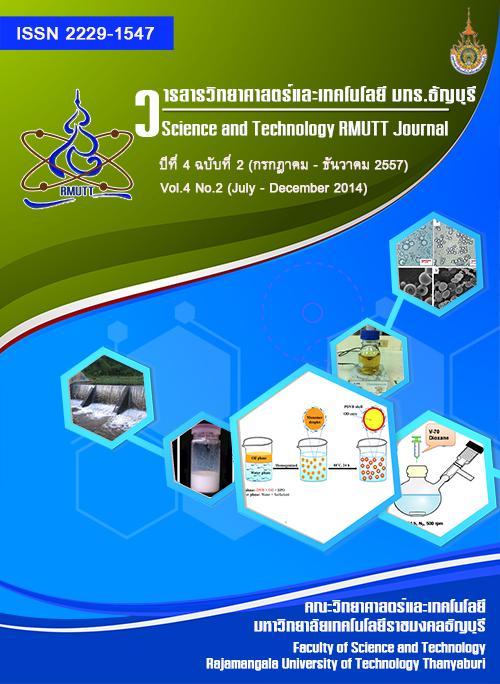Effect of Clove Extract on Sleeping Time in Mice
Main Article Content
Abstract
Insomnia leads to uncomfortable and affect for daily life. Sometime, it need to take a medicine for sedation. Clove (Syzygium aromaticum (L.) Merr.&L.M.Perry) is herb, mainly contains eugenol which benefits to treat a variety of diseases. The objective of this research was to study sedative effects of clove extract in mice. Our results showed that all the doses (250, 500, and 750 mg/kg) of clove extract in acacia solution showed significant difference (p<0.05) in the onset (the time from oral administration to the loss of righting reflex) as compared with the control group. However, 750 mg/kg clove extract showed significant difference (p<0.05) in duration time (the time from the loss of righting reflex to awakening) on sleeping time. In addition, 750 mg/kg clove extract showed the highest of the duration time 146.2±7.66 min as compared with the other doses. It is possible that clove extract may be able to help for relaxation. Also, we need to study the mechanism of action prior to the development of a natural product for sedation.
Article Details
References
K.T. Olkkola, J.Ahonen. Midazolam and other benzodiazepines. Handbook of Experimental Pharmacology. 182 (2008): 335-360.
T. Roth, F.zorick, J. Sicklesteel, E. Stepanski. Effects of benzodiazepines on sleep and wakefulness. British Journal of Clinical Pharmacology. 11 (1981): 31-35.
J.A. Hollway, M.G. Aman. Pharmacological treatment of sleep disturbance in developmental disabilities : A review of the literature. Research in Developmental Disabilities. 32 (2011): 939-962.
ส. พงษ์บุญรอด. ไม้เทศ เมืองไทย. เกษมบรรณกิจ, กรุงเทพฯ. 2522.
C. Ghelardini, N. Galeotti, L. Di CesareMannell, G. Mazzanti, A. Bartolini. Local anaesthetic activity of β-caryophyllene. II Farmaco. 56 (5-7) (2001): 387-389.
J. Briozzo. Antimicrobial activity of clove oil dispersed in a concentrated sugar solution. Journal of Applied Bacteriology. 66 (1) (1989): 69-75.
S. Roengsumran, A. Petsom, S. Thanniyavarn, S. Pornpakakul, S. Khantahiran. Antibacterial Activity of Some Essential Oils. Journal of Scientific Research Chulalongkorn University. 9 (1997): 13-19.
A. Ebadollahi. Essential Oils Isolated from Myrtaceae Family as Natural Insecticides. Annual Review & Research in Biology. 3 (3) (2013): 148-175.
ณ. อุทยารัตน์. อัตราส่วนที่เหมาะสมของน้ามันกานพลู (clove oil) ต่อเวลาการคลายตัวของกล้ามเนื้อ เท้าหอยเป๋าฮื้อไทย (Haliotis asinina). บทความวิจัย หน่วยปฏิบัติการวิจัยเทคโนโลยีการเพาะและ เลี้ยงหอยเป๋าฮื้อไทย. (2547).
K.K. Sladky, C.R. Swanson, M.K. Stoskopf, M.R. Loomis, G.A. Lawbart. Comparative efficacy of tricaine methane sulfonate and clove oil for use as anesthetics in red pacu (Piaractus brachypomus). American Journal of Veterinary Research. 62 (3) (2001): 337-342.
D.R. Helton, J.P. Tizzano, J.A. Monn, D.D. Schoepp, M.J. Kallman. Anxiolytic and Side-Effect of LY354740 : A Potent, Highly Selective, Orally Active Agonist for Group II Metabotropics Glutamate Receptors. Pharmacology and Experimental Therapeutics. 284 (2) (1998): 651-660.
M.W.L. Koo. Effects of Ginseng on Ethanol Induced Sedation in Mice. Life Sciences. 64 (2) (1999): 153-160.
K. Silverman, S.M. Evans, E.C. Strain, R.R. Griffith. Withdrawal syndrome after the double-blind cessation, caffeine consumption. The New England Journal of Medicine. 327 (1999): 1109-1114.
O.J. Owolabi, F.C. Amaechina, A.B. Eledan. Central nervous system stimulant effect of the ethanolic extract of Kigelia africana. Journal of Medicinal Plants Research. 2 (2) (2008): 20-23.


